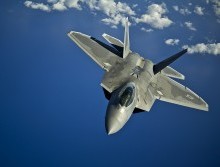
US jets and Iranian jets are fighting ISIS—just not together. US F-22 jet. Illustrative. Photo Courtesy of U.S. Air Force photo/Tech. Sgt. Michael Holzworth.
Sometimes shared enemies create odd partnerships. And right now, the US and Iran have a shared enemy in the ISIS (ISIL) terror group. But despite their joint interest in defeating ISIS, they aren’t working together, according to them. The Guardian newspaper quoted an Iranian official who confirmed that his nation did in fact conduct air strikes on ISIS targets inside neighboring Iraq, whom he described as Iran’s “friends.”
The official—Iranian deputy foreign minister Ebrahim Rahimpour—also told The Guardian the effort was not coordinated with the US. That’s one thing the Americans and Iranians agree upon, as the US has also confirmed they’re not working with Iran against ISIS. Pentagon Spokesman Rear Admiral John Kirby told reporters that they are not coordinating with Iran, not even to avoid interactions between US jets and Iranian ones. Kirby said that process of separation—known as deconflicting—was up to Iraq and “they’re competent enough” to do that.
“We are flying missions over Iraq. We coordinate with the Iraqi government as we conduct those. It’s up to the Iraqi government to deconflict that air space,” said Kirby in comments posted to the Pentagon’s website last week. “Nothing has changed about our policy of not coordinating military activity with the Iranians.”
Meanwhile, the Iranians said their airstrikes in Iraq came at the request of the Iraqi government. While Rahimpour said they have not sent ground troops into Iraq, he made it clear they didn’t want Iraq to turn into another Syria—another Iranian ally battling ISIS, albeit as part of a broader civil war. Syria’s regime has waged a multi-year battle with both moderate rebels and terror groups.
More than 100,000 are believed to have been killed in the Syrian conflict—many of those civilians, who died at the hands of the Syrian regime. At times, the Syrian government has looked especially vulnerable, although the general sense is that the fight has turned their way.
Taking advantage of the instability in the Syrian war, ISIS forces managed to carve out sections of Syria and Iraq and claimed the conquered territory was a new Islamic State—which became another nickname for the terror group. ISIS’ aggressive brutality has raised concerns they could eventually try to conquer all of Iraq and keep spreading in the Middle East.
Iraq is a complex regional player, as it has relationships with both Iran and the US. So with Iraq in trouble in its fight with ISIS, the Americans and Iranians—two archenemies traditionally—are now fighting ISIS on in support of Iraq. Just not together.
(By Joshua Spurlock, www.themideastupdate.com, December 7, 2014)
